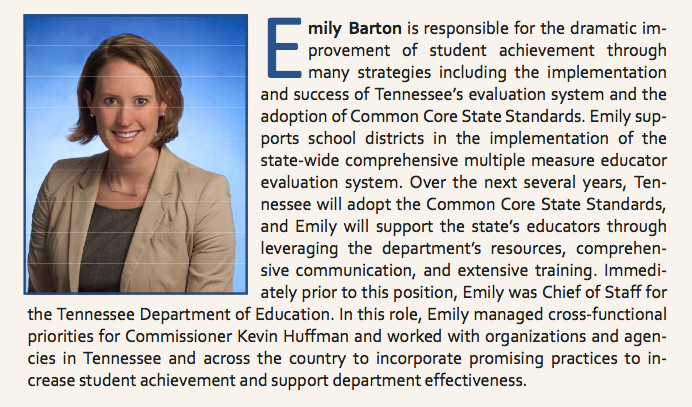Here is our interview with State Representative Craig Fitzhugh (D-Ripley), the Democratic Leader in the House.
What are the top education priorities for Democrats in the 2014 legislative session?
House Democrats are focused on creating quality public schools for every child. Education reform has been the buzzword at legislative plaza for a number of years, but we remain concerned that these changes have been more about style than substance.
We remain concerned about teacher evaluations and the negative impact they have on teacher moral and retention.
We have concerns about common core, not so much the standards, as the speed with which they have been implemented. We want to make sure that our schools are technologically ready for Common Core testing, especially where our rural schools are concerned with bandwidth and our urban schools with computer availability.
Democrats also strongly support a universal pre-k program. Currently, there is $64,000,000 in federal funding available to Tennessee for this purpose. We have legislation, HB 291, that would allow us to take advantage of this program and extend pre-k to thousands of Tennessee children.
What’s the Democratic view on the role of the State in public education?
Tennessee has two constitutional responsibilities: a balanced budget and a free system of public education. On the latter, we believe Tennessee must do better.
Depending upon which study you read, Tennessee ranks near the bottom in funding for public education. While we are proud of what our teachers and parents have done with little funding (in particular the spectacular improvement in graduation rates we’ve seen over the last number of years), we believe that we have to be careful in preserving these precious public dollars. Now is not the time to take public money and send it to untested charters or private institutions. This will only serve to take more money from the already small pot of funding we have for our public schools.
Will there be a move to address and improve BEP funding along the lines of BEP 2.0?
There are a few proposals before the General Assembly that deal with BEP, primarily with the state’s portion of funding. At this time, I’m not aware of any other Democratic proposals that will change the BEP, especially in light of a tight budget cycle.
Will Democrats support efforts to limit or remove TVAAS scores from teacher evaluation?
Democrats remain concerned about the teacher evaluations and their deleterious effect on teacher moral and retention. At a minimum, we believe there needs to be a moratorium on teacher evaluations as they currently stand, while a review is undertaken by the Department of Education, in consultation with educators.
Will Democrats attempt to address the state board’s action on teacher pay?
Democrats opposed the unusual decision of the State Board of Education to do away with the state minimum salary schedule. We are particularly concerned that this decision was made without any input from legislators and at a time when the General Assembly was not in session.
The State Board of Education is a group of unelected individuals who have had an outsized impact on education policy over the last year. While we don’t have a caucus position yet, I anticipate a lively discussion concerning their role.
The Democrats will be introducing legislation to require the Commissioner of Education to have teaching experience. Can you describe that bill? Is it a shot a Commissioner Huffman, who only has a few years of teaching experience?
In order to be a judge, an individual must have been a practicing lawyer for five years. We think that those who are charged with the education of our children should be held to an even higher standard.
This bill is not about any individual person, it is about a fundamental lack of respect we’ve seen for those who teach during this administration. Part of the problem is that senior officials at the Department of Education lack the in-classroom experience necessary to understand the ramifications of their policies. This legislation hopes to address the growing gap we see between public policy and practical application.
We saw last session that some rural Republicans were not happy with some of the education bills coming from the administration. Do you think the Democrats can pair up with certain Republicans to oppose vouchers and state-authorizer?
As I’ve said before, if there is one issue that unites Democrats it’s a commitment to public education. With that in mind, I would tell you that we are happy to partner with whomever we need to in order to achieve the best outcomes possible for our students, our teachers and our communities.
What is the counter argument on vouchers? If students are stuck in failing schools, and those schools aren’t going to turn around immediately, why make them stay there? Isn’t even a small lifeline for some kids better than nothing?
Vouchers are not a lifeline, they are at best a band-aid: they are only available to a limited number of students and studies have shown that those students do no better than the counterparts they leave behind in public schools. Meanwhile, what they will accomplish is a wholesale defunding of public schools. As I said earlier, we have a very limited pot of money for public education. When you start pulling funds out for virtual schools, charter schools and now vouchers, you take that limited pot of funds and make it even smaller. If we were like Ohio and were in the mid-thirties or lower on per pupil funding, I’d be in favor of this program. As it stands now, however, we can’t justify taking money from our already cash-strapped public education system.
